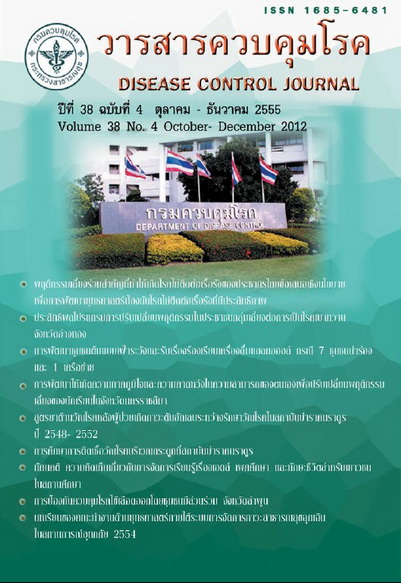Attitude and Concept of AIDS, Sex Education and Life Skills Management Learning for Youth in Academic Institute
Keywords:
AIDS, Sex education, Youth in Academic InstituteAbstract
The objective of this study was to compare knowledge, perception, attitude and concept about AIDS, sex education and life skills among participants of the training course. The results of this study will develop the training guideline of AIDS, sex education and life skills. Questionnaires were used for this study and collected before and after training with the participants who were officer of Education Service Area Office, Disease Prevention and Control Office, Provincial Public Health Office, Region Health Promotion Center, and Region Mental Health Center. The total of available questionnaires were 239 at the beginning (pretest) and 212 at the end (post-test). The data were analyzed using frequency distribution, percentage, mean and standard deviation. The results found that the knowledge and perception about AIDS, sex education and life skills at the end was higher than the beginning (percentage were 74.53 %, and 48.54 %). Knowledge needs assessment; participants need to know about reproductive health, STIs, and unwanted pregnancy and abortion (percentage were 21.97 % , 20.20 %, and 19.32 % respectively). The results from qualitative data found that the idea for teaching sex education16 hours per year can be done by giving a policy from Educational Ministry and Office of Basic Education Commission. It also can be integrated with school curriculum because it is useful curriculum for their students. Some of them disagree; the reasons are having many jobs, lack of teacher, unclear policy and lack of budget or less. Most of education institutes and organizations both have an AIDS and STIs curriculum to teach or train their clients. In addition, it found the problems of AIDS, sex education and life skills learning activities were having more contents in curriculum, lack of learning activities that enhancing understanding AIDS, sex education and life skills. The problems that occurred from teacher were teaching skills, lack of knowledge and information. Unclear policy from Educational Ministry and not supported continuity from the executive of each academic institute is one factor that effecting to success.
Downloads
References
2. สำนักโรคเอดส์ วัณโรค และโรคติดต่อทางเพศสัมพันธ์. รายงานผลการดำเนินงาน ปี 2554. พิมพ์ครั้งที่ 1.โรงพิมพ์องค์การสงเคราะห์ทหารผ่านศึก ในพระบรมราชูปถัมภ์. กรุงเทพมหานคร,2555
3. สำนักงานบริหารโครงการกองทุนโลก. โครงการวิจัยประเมินโครงการสนับสนุนการป้องกัน และการดูแลรักษาระดับประเทศด้านเอดส์ที่ได้รับจากกองทุนโลก รอบที่ 1 และรอบที่ 2 .โรงพิมพ์ชุมนุมสหกรณ์การเกษตรแห่งประเทศไทย จำกัด. กรุงเทพมหานคร, 2550.
4. คณะกรรมกรรมแห่งชาติว่าด้วยการป้องกันและแก้ไขปัญหาเอดส์. รายงานความก้าวหน้าระดับประเทศ ตามปฏิญญาว่าด้วยพันธกรณีเรื่องเอชไอวี/เอดส์. พิมพ์ครั้งที่ 2 โรงพิมพ์สำนักงานพระพุทธศาสนาแห่งชาติ.บริษัทเฟื่องฟ้าพริ้นติ้ง จำกัด. จังหวัดปทุมธานี,2552
5. องค์การแพธ.โครงการ "ก้าวย่างอย่างมั่นใจ" คู่มือฝึกอบรมผู้จัดการเรียนรู้เพศศึกษาแบบรอบด้าน. กรุงเทพฯ : องค์การแพธ (Path) ภายใต้การสนับสนุนของกองทุนโลก กระทรวงสาธารณสุข. บริษัทเออร์เจนท์ แทค จำกัด.กรุงเทพมหานคร, 2553
6. เบญจพร ปัญญายง. การทบทวนองค์ความรู้: การตั้งครรภ์ในวัยรุ่น. สำนักงานกองทุนสนับสนุนการสร้างเสริมสุขภาพ. พิมพ์ครั้งที่ 3. กรุงเทพมหานคร,2554
7. IPPF European Network. A reference guide to policies and practices: The SAFE project.2006 Available from http:// www.ippfen.org(12 April 2010)
8. SantelliJ, Ott MA, Lyon M, Rogers J, Summers D, Schleifer R, Abstinence and abstinence-only education: a review of U.S. polices and programs. J Adolesc Health. 2006; 38(1): 72-81
9. นุชนารถ แก้วดำเกิง และชีวนันท์ เลิศพิริยสุวัฒน์. นโยบายกับแนวทางการพัฒนาการเรียนการสอนเรื่องเอดส์และเพศศึกษา วารสารกรมควบคุมโรค. 2553; 36: 90-100
10. องค์การแพธ. แนวทางการจัดการเรียนรู้เพศศึกษารอบด้านในสถานศึกษาสำหรับผู้บริหาร.โรงพิมพ์เออร์เจนท์แทค จำกัด. กรุงเทพมหานคร,2550
11. องค์การแพธ. แนวคิดในการออกแบบการจัดการเรียนรู้สำหรับครูและผู้ปฏิบัติงานด้านเพศศึกษา สำหรับเยาวชน. บริษัทเออร์เจนท์ แทค จำกัด. กรุงเทพมหานคร,2550.
Downloads
Published
How to Cite
Issue
Section
License
Articles published in the Disease Control Journal are considered as academic work, research or analysis of the personal opinion of the authors, not the opinion of the Thailand Department of Disease Control or editorial team. The authors must be responsible for their articles.






